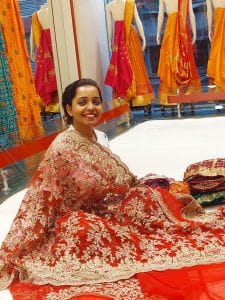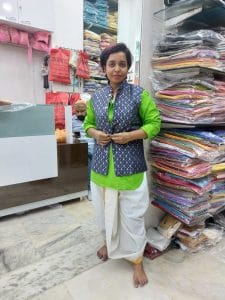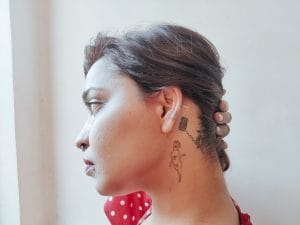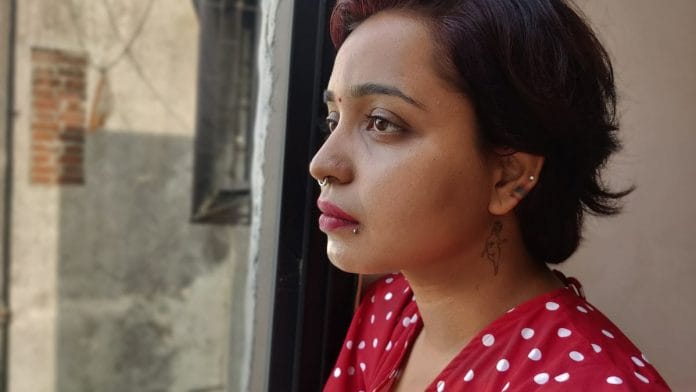I choose me — inked right below her left collar bone, Kshama Bindu has taken her tattoo more literally than anyone could have imagined. She declared that she will marry herself, in what is perhaps India’s first sologamy wedding. All hell has broken loose since.
The priest has backed out. The wedding venue, a temple, is no longer available. Local BJP leaders have condemned her decision, and haters are digging up her past to defame her. A dozen reporters landed at her door, which now has a sign ‘No Media Allowed’. And her neighbours have demanded she vacate her flat right away.
All this because the 24-year-old ‘digital creator’ and recruiter from Gujarat’s Vadodara publicly declared that she was going to marry herself.
Despite the backlash where the priest declared he would rather marry her to a tree, wedding preparations are in full swing, complete with mehendi and haldi ceremonies.
Taking the criticism and harassment in stride, Bindu says, “Mandir nahi toh koi baat nahi, shaadi toh mai karke rahungi (Temple or no temple, I will marry).”
Bindu plans to wear a plain yellow sari for the haldi ceremony. For the mehendi, she’s bought a green kurta and white dhoti that she’ll top off with a purple jacket.
That she is under virtual house arrest with the media camping outside her door did not stop her from going on a shopping expedition. “I slipped out of the house with my face covered and did all the shopping I could in a day. Right now, everyone can recognise me by my face and I’m afraid of getting heckled,” she says.
The wedding is scheduled for later in June, though the attention it has received has forced Bindu to alter some of her plans. Initially, she wanted to ride her Activa scooter in her red wedding lehenga, with the words ‘Just married’ written on it. For now, though, that plan has been put on hold.

Also read: Grindr, PlanetRomeo, Gayglers — corporate queerness reached India. But many still in closet
Politicians, priests upset
Her views have upset the BJP cadre in Vadodara. BJP leader Sunita Shukla said this goes against Hinduism and that such acts will reduce the population of Hindus. “Neither the constitution nor society can recognise such a wedding. Children will start following this trend set by her. Even if 100 men and women follow the example set by her, the number of Hindus will reduce by 400, that is if we take an average of two children per family,” says Shukla.
Speaking to ThePrint, Devendra Pandit, the priest who had initially agreed to marry her, said he thought it was going to be a ‘kumbh wedding’, where one marries a mudpot or other inanimate objects to get rid of ‘manglik dosh‘. But upon learning that Bindu was going to marry herself he refused to preside over the ceremony. “Hindu dharam mein iski koi jagah nahi hai (Hinduism has no space for such ceremonies),” he says.
Devendra was more than happy to sit at the wedding if Bindu was marrying a doll, a tree or a ‘matki’, but the concept of marrying oneself is a line too far. “Manglik women who have dosh of Surya devta or Mangal Devta marry peepal trees or matkis. That provision is there in our religion but not marrying oneself.”
As a pandit is out of the picture now, she’s exploring the idea of using recorded mantras. “We’ll play pre-recorded wedding mantras, and shlokas and I’ll follow all the instructions accordingly. I know what vows I have to read for myself. So that’s not going to be a problem,” Bindu tells ThePrint, as she scrolls through her phone checking her Instagram account and answering calls from her friends.

Also read: No women, LGBT representation — criminal law review panel criticised for lack of diversity
Unprepared for the backlash
Though she is silent about her family’s reaction to her decision, Kshama Bindu has plenty of friends who call her incessantly enquiring about what to wear, requesting her to change dates to fit their schedules or exploring the chance to attend via Zoom. She attends these calls and laughs shyly like a typical bride-to-be, her eyes sparkling whenever she shares her wedding plans.
Her college friend, Gargi Tablawala, describes her as an “eccentric narcissistic personality.” “I have known her since the first year of college. She’s a very hatke person. Does things on her own, and is kind of a narcissist,” she chuckled. Surprised at first, her friends have warmed up to the idea of her self-wedding. “I think it’s awesome,” Tablawala says.
Bindu, however, was unprepared for the nationwide stir her impending nuptials have caused. She approached a few journalists she knew to write about her decision to marry herself. On 2 June, The Times of India ran with it; the very next day, at least two dozen reporters landed up outside her house. Bindu became a national sensation overnight. “I thought of sharing the news in Vadodara, but the kind of national and international attention I’ve been receiving is intimidating,” she says.
Sitting in her airy 1 BHK flat in Vadodara, she scrolls through news reports on her phone and scours social media for comments that she has been receiving. From a few thousand, her followers increased to 24,000 in three days. Trolling has turned from mockery to abuse within a matter of days. “People are digging deep into my history, saying unsavory things about my family. I can take abuse directed at me but the comments directed at my family hurt,” she said.
A visit to Bindu’s house invites aggressive questioning from her neighbours. “What work do you have here? If you’re a reporter, turn around right now,” one neighbour told ThePrint when we reached the location.

Also read: Acceptance of LGBTQ people has risen worldwide: Pew survey
Bride, not bahu
While she always wanted to be a bride, she says, she can never be a bahu. “I was watching the 2017 Canadian TV series on Netflix, Anne with an E, where Anne says, ‘I want to be a bride but not a wife.’ That’s when the idea occurred to me, and I discovered sologamy,” she told ThePrint.
Now she has chosen herself. Her body is a canvas–with 19 tattoos promoting self-love, philosophy and independence. Right below her right ear is a naked woman from a Japanese anime lying in a relaxed position. There are flying birds on the nape of her neck and a Buddha on her right arm, to name a few.
Bindu knows exactly what she wants. She started working when she was 17 and has been self-sufficient since then. She was born in Ahmedabad, grew up in Daman and graduated from college in Vadodara, where she now works.
She sees the act of self-marriage as empowering for women stuck or coming out of toxic or abusive relationships. “In marriages, women are often subjected to domestic abuse and marital rape. So many divorced women have written to me saying they wish they were aware of the concept, then they wouldn’t have gotten married in the first place.”
Sologamy upends a patriarchal institution, one that is seen as a milestone in every woman’s life. “I can’t wait to wear the sindoor. What’s better? I am going to be wearing it for myself, my own protection, not for someone else,” she says.
Bindu, who is bisexual and identifies as bi-gender, is no stranger to heartbreak. She has been in two serious relationships—one with a man and another with a woman, whom she broke up with recently in March. “People often leave me saying I’m too much for them,” she says, “I have a lot of love to give. That can be overwhelming.”

Also read: How Covid spelled doom for LGBTQI+ characters on TV
In popular culture
Sologamy, or the act of marrying oneself, is not common in Indian popular culture, and when it is addressed, it’s usually in a negative light. For instance, in Hardik Mehta’s 2021 film, Roohi, the protagonist, played by Jahnvi Kapoor, is possessed by a spirit. She decides to ‘marry’ the spirit, running away with herself on an Enfield bullet at the end of the film.
On the other hand, Carrie was lauded by viewers and single women when she decided to marry herself in the 2003rd episode of Sex and the City. Glee’s cheerleading coach, Sue Slyvester, also took a similar decision. In the 2016 movie Zoolander 2, All, a transgender model played by Benedict Cumberbatch, is married to herself.
An increasing number of women are choosing to marry themselves. An article in BBC claims that one woman presided over 1,500 sologamy ceremonies between 2000-2017. There are self-wedding service providers like ‘Marry Yourself’ in Canada, ‘IMarriedMe.com’ in the United States and Cerca Travels in Japan.
Legally, there’s no provision to marry yourself in India or in the world. Bindu wants to change this. “I have been thinking, and I might end up approaching the courts to legalise the act of marrying oneself once my wedding is done,” she tells ThePrint.
(Edited by Zoya Bhatti)






